R.E. Bradshaw's Blog, page 2
April 7, 2015
Things Rita Mae Said: Or, as I call it, my WWRMD list (What would Rita Mae Do?)
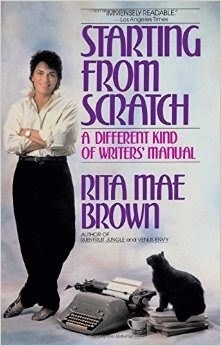 Though some of it is dated (published in 1989, much has changed,) Dr. Brown's Starting From Scratch is a dog-eared valuable asset in my writing library. I made a list of excerpts to refer to when I am in the throws of artistic self-doubt.
Though some of it is dated (published in 1989, much has changed,) Dr. Brown's Starting From Scratch is a dog-eared valuable asset in my writing library. I made a list of excerpts to refer to when I am in the throws of artistic self-doubt.Buy the book here: http://www.amazon.com/Starting-Scratch-Rita-Mae-Brown/dp/055334630X
My top ten writer’s soul-healing words of wisdom from Dr. Rita Mae Brown’s Starting from Scratch
1. Your readers are your best friends. As time goes by you’ll find out who they are. No two readers are alike. These distinct individuals put down good money for your work and then spend their valuable time reading it… Sometimes people throw tomatoes instead of roses, but hell, they sat at their desks and tried to connect with me. I give them credit. I’ve learned more from my readers than I have from the usual literary sources: other writers, publishers, critics. 2. I expect most writers feel about critics the way a fireplug feels about dogs. However, no matter how many dogs befoul your work they can’t really hurt you…A book still sells by word of mouth. You can be sliced and diced from the Atlantic to the Pacific and have a runaway best seller.3. On my bad days I think of a critic as someone who’d put a cyanide cap in an Easter egg. Tallulah Bankhead said, “Criticism is the distillation of bias and prejudice.” The truth lies somewhere between me and Tallulah. Most critics can’t create what they criticize. If another novelist writes a review, that’s one thing. If the review comes from anybody else, it’s hard for me to take it seriously. But then, as you may have gathered, it’s hard for me to take anything seriously. 4. As a writer my feeling is that the critic can help me only when I am writing the book. I don’t read reviews of my novels. They’re too late to do me any good. 5. If you’re one of those people who reads everything written about you, I suggest you be grateful if your name and the book title are spelled correctly. 6. Don’t be surprised, if you do read criticism, if you are personally criticized through the book. The more controversial you are, the more loaded the reviews. My advice: Eat the chitlins of forgetfulness. 7. Reading into the tea leaves of literary triumph can be thrilling. Sober up, honey. Tomorrow they’ll be on to someone else. 8. Don’t believe your own publicity. That way madness lies. You’ll soon be stinking in your own decayed ego. 9. Don’t feel responsible for how people misuse your work. Whatever you do can be used against you and probably will be. Keep writing. You’re on earth to write, not to indulge yourself in petty squabbles justifying yourself to pissants.
10. Whether fame or notoriety is your fate, put it behind you and put the typewriter in front of you. And put next to your typewriter these words from Albert Einstein: “The only way to escape the personal corruption of praise is to go on working.”
Published on April 07, 2015 09:06
October 9, 2014
My Second Concussion Or The First Time I Shaved My Leg
 With my track record and the fact that my mother ran screaming to the old retired nurse's house next door, with two year old me in her arms—I had hit my head on the coffee table after jumping off the couch and still bear the scar—I assume that I had many concussive events in my childhood.
With my track record and the fact that my mother ran screaming to the old retired nurse's house next door, with two year old me in her arms—I had hit my head on the coffee table after jumping off the couch and still bear the scar—I assume that I had many concussive events in my childhood.The first one of which I actually have a memory happened at age eleven. I was a wiz at the pogo stick and could jump on it with no hands, most of the time in complete control. I never got hurt on the pogo stick, even hands-free bouncing down the country roads we lived on. That streak and practice ended on a wet concrete porch during a summer rainstorm. I was temporarily paralyzed for a few minutes and remember the tingling sensation of my body reawakening, that’s about it.
Back then, our parents only took us to a doctor if we stopped breathing or were bleeding excessively. I don’t remember any special care taken and I probably played softball as soon as the rain stopped. I don’t know what I did. I can’t remember the events prior to or after the event. I’m quite sure, if I was still walking and talking, no one gave a thought to a brain injury. Helmets were never even part of the conversation. I am also sure that with the many concussions I’ve experienced since then, the pogo stick calamity was the most severe and made all the others worse. My scalp feels like the moon with all its craters, and there is one really soft spot where a hammer nearly penetrated my skull. All of these injuries were caused by my lack of attention. After all, it was my own hammer that I left on top of a ladder that laid me out on stage for a few minutes.
 sourceI’m currently suffering from a mild concussion, again of my own doing. The circumstances of this injury, smacking my head after a dive, are very similar to the second concussion I remember giving myself. Water and sand can be as unforgiving as concrete. Unlike many of my head banging traumas, my second concussion makes me laugh. Saved from my mother’s wrath by what could have been a tragedy had I hit harder or at another angle, this particular stupid move saved me from the craziness that was southern motherhood in the early seventies.
sourceI’m currently suffering from a mild concussion, again of my own doing. The circumstances of this injury, smacking my head after a dive, are very similar to the second concussion I remember giving myself. Water and sand can be as unforgiving as concrete. Unlike many of my head banging traumas, my second concussion makes me laugh. Saved from my mother’s wrath by what could have been a tragedy had I hit harder or at another angle, this particular stupid move saved me from the craziness that was southern motherhood in the early seventies.At the time of my twelfth summer, 1973, I began to notice on my peach-fuzz-blond coated legs the sprouting of dark, stiff hair. I did not particularly care for this phenomenon, but was forbidden from shaving my legs until my mother cleared me for this activity. She seemed to believe that once I started shaving I would turn into a sasquatch, which was to be postponed as long as possible. It was a right of passage into womanhood according to mother. I just thought it was time to get rid of the dark hair that looked so strange in the forest of wispy blond fuzz. No way in hell was I going to tell my mother my leg hair was turning dark and was noticeable. It would have precipitated one of those “you’re getting older” speeches that were either tear-filled lamentations or finger-wagging threats against the soiling of one’s reputation like those fast girls. Little did she know, I got most of my sex education from the fast girls, such as the proper use of feminine products and when it was okay to shave my legs. Those girls weren’t as fast as my mother thought they were. They were just the worldly young women she was trying desperately to keep me from becoming.
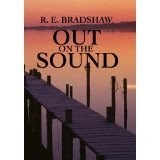 The only picture I have of Currituck Sound
The only picture I have of Currituck SoundLike most summer evenings, it began with families winding down from the day and relaxing on Currituck Sound. I had been playing softball and joined the gathering late. I was made later by the decision to stop at my empty house to shave and lotion up, as the worldly girls had instructed. I loved the feeling of my smooth skin as I rubbed them down with Coppertone, before heading down to the water. My mother was seated with one of her friends at the end of the dock on a blanket, and as I passed by my knees were eye level to her. I thought I had made a clean getaway, when we exchanged greetings and then she went back to her conversation. It wasn’t until I felt her tight grip on my calf that I knew she was on to me. “Did you shave your legs?” she demanded.“Yes, I did,” I said with more attitude than I should have.She started to rise from the blanket, when her friend said, “Anne, she’s old enough. The other girls are shaving too.”

A debate broke out between the two older women, allowing me an opportunity to escape. The other kids were already in the water, a shallow sound that changed levels dramatically with the tides. I could see they were chest deep in the water, took two running steps, and dove for freedom. Not knowing that my friends were on their knees, I dove too deep. I knew better. A quick look around at the neighboring dock pilings or a glance over my shoulder at the bulkhead would have clued me into the tide levels, but the circumstances required I put distance between my mother and myself. I nearly broke my neck, which would certainly have solved her dilemma of how to prevent me from growing up. Luckily, it only chipped a few molars and left me brain damaged for a few days.
I remember crawling toward the dock—yes, it was that shallow—finally making it up the ladder, and falling out on the worn gray boards. I never got in trouble for shaving my legs, as I started spitting out bits of teeth and vomiting. The hair grew back, I went to the dentist—notice no doctor was consulted—and we moved on to teenaged drama soon after that. So, when I think about getting a concussion from diving in the ocean last weekend, I can’t help but remember how close I came to dying or permanent spine injury over shaving my legs. I suppose that was when the war began between mother and daughter. I had a concussion, but I wasn’t in trouble for shaving the legs I used to express my first attempts at independent personhood. Bless my mother’s heart, I was not the easiest child to raise.

Published on October 09, 2014 18:27
August 9, 2014
Worthy of a Dream

I was talking to one of the guys working on the house. He not only speaks English and Spanish, he is fluent in Italian. He's working alone today. The rest of the crew has the day off, but he needs the hours. His children went to the dentist this week. Most of us can relate to the dreaded dentist bill. He learned to speak and write Italian and became an Italian chef, while working in a restaurant in L.A. Today he was listening to a pop radio station that plays a lot of eighties music. He said that's how he learned to speak English back in the day, listening to our top forty stations. He works construction because he makes more money to feed and house his two young daughters, but he has a dream to one day own a restaurant, an Italian restaurant. Because his skin is brown, his accent foreign, people rarely think to ask him about his dreams and hopes for his children. They see a "Mexican," a "Wetback," a "Beaner," an "Illegal alien." I took the time to learn his name, his story, his courage, and I'm a better person for it. Those people holding signs and yelling at children crossing our borders—children with dreams—aren't looking beyond labels. They don't see human beings in search of self-worth and in the pursuit of freedom to dream. I fail to see how the Republicans, including former Senator and now the current Governor of Oklahoma, passed the legislation that invited these children here and then turned this into a political football with the current administration. We need secure borders, but let us not forget these are borders of our making. Suppose someone drew a line across your yard, and suddenly your family was no longer the same nationality. Texas should just be quiet. Really, “invading our country?” How quickly wars that displaced indigenous people can be erased from the social memory.
 But, politics aside—please, stop assuming every person with brown skin is here illegally. And for the love of humanity, stop assuming the woman cleaning that toilet is too inept to do anything else. Maybe she’s working her way through night school. Maybe she’s a well-respected teacher in her country, fleeing persecution for being a woman with a voice. Maybe she works a low wage job, cleaning up after the more privileged white women holding those signs and screaming at busloads of children, because someone took away her dream of a better life a long time ago. Or better yet, maybe she owns the business and works just like the rest of us to feed our families. We make hundreds of assumptions a day, to what end? We miss so much by doing so. We miss making friends and create more enemies by doing so. A person is less likely to be a burden on society if they are invested in that society. They are more likely to cause trouble if society isn’t invested in them. The way to solve the world's problems with poverty, illiteracy, and tribal warfare (which is all war amounts to in the end—tribes of men since ancient times, clinging to dogmatic self-righteousness,) is to allow people to dream, to become their best selves. It's hard to live up to your potential, when you're told you are not worthy of a chance.It's time we spread some empathy around. We've all faced discrimination of one kind or another, whether it be based on gender, race, sexuality, religion...wait, I can't say all, because there is privilege so profound that empathy with their fellow man is unfathomable. Anyway, some of us, many of us, know prejudice. We know that the assumptions of others often define how we are perceived. People fear what they don't see in the mirror. It's a left over instinct, from a time when a stranger in the cave was a scary proposition. We shed much of our body hair because we didn't need it to survive. It's time we shed some more of our innate human behaviors, the ones based on fears that are no longer relevant to our evolution as a species. Take away privilege, skin color, and circumstances of birth, and what do we have—a human being worthy of a dream.
But, politics aside—please, stop assuming every person with brown skin is here illegally. And for the love of humanity, stop assuming the woman cleaning that toilet is too inept to do anything else. Maybe she’s working her way through night school. Maybe she’s a well-respected teacher in her country, fleeing persecution for being a woman with a voice. Maybe she works a low wage job, cleaning up after the more privileged white women holding those signs and screaming at busloads of children, because someone took away her dream of a better life a long time ago. Or better yet, maybe she owns the business and works just like the rest of us to feed our families. We make hundreds of assumptions a day, to what end? We miss so much by doing so. We miss making friends and create more enemies by doing so. A person is less likely to be a burden on society if they are invested in that society. They are more likely to cause trouble if society isn’t invested in them. The way to solve the world's problems with poverty, illiteracy, and tribal warfare (which is all war amounts to in the end—tribes of men since ancient times, clinging to dogmatic self-righteousness,) is to allow people to dream, to become their best selves. It's hard to live up to your potential, when you're told you are not worthy of a chance.It's time we spread some empathy around. We've all faced discrimination of one kind or another, whether it be based on gender, race, sexuality, religion...wait, I can't say all, because there is privilege so profound that empathy with their fellow man is unfathomable. Anyway, some of us, many of us, know prejudice. We know that the assumptions of others often define how we are perceived. People fear what they don't see in the mirror. It's a left over instinct, from a time when a stranger in the cave was a scary proposition. We shed much of our body hair because we didn't need it to survive. It's time we shed some more of our innate human behaviors, the ones based on fears that are no longer relevant to our evolution as a species. Take away privilege, skin color, and circumstances of birth, and what do we have—a human being worthy of a dream.
Published on August 09, 2014 11:38
July 30, 2014
Meet Mardi-Jean Payne—My entry in the Character Blog Roll
Author Carole Wolf invited me to participate in the character blog roll for my most recent work in progress, In Passing, a romance set in the present, but dependent upon the past. Mardi-Jean Payne is the main character in a novel populated by generations of women of the south and their memories.
1). What is the name of your character, and is he/she fictional or a historical person?
Her name is Mardi-Jean Payne, the Jean is pronounced as a French speaker would. Her mother, Agnes, named her Mardi-Jean because she believed her father was a French guy named Jean, with whom she had a Mardi Gras fling in 1968. Mardi is a fictional character.
2). When and where is the story set?
 The story is set in 2014, on a fictional island, in the middle of the very real John H. Kerr Reservoir, north of Warrenton, NC, where the southern drawl was passed down by the founding families of colonial Virginia, who settled this portion of the piedmont. The accent hangs on to this day, like the social class designations and private clubs, and now flows from a workman’s tongue as easily as it drips from the lips of former debutantes and southern gentleman farmers . The reader will also accompany two half-sisters, born in 1920, as they navigate the old south, Europe during World War II, and the social changes in their lifetime, through the memories of the one who remains.
The story is set in 2014, on a fictional island, in the middle of the very real John H. Kerr Reservoir, north of Warrenton, NC, where the southern drawl was passed down by the founding families of colonial Virginia, who settled this portion of the piedmont. The accent hangs on to this day, like the social class designations and private clubs, and now flows from a workman’s tongue as easily as it drips from the lips of former debutantes and southern gentleman farmers . The reader will also accompany two half-sisters, born in 1920, as they navigate the old south, Europe during World War II, and the social changes in their lifetime, through the memories of the one who remains. 3). What should we know about him/her?
Mardi is forty-five, the daughter of a pot smoking, old hippie, artist mother and an unknown father. She is an old soul, preferring the things and people of the past to those of the present, prompting her mother to say, “You live in the wrong tense, Mardi-Jean.” She has a master’s degree in Art History and is an antiquities appraiser by trade. Life hasn’t been too kind to Mardi in the love department. She explains to her therapist, “I’m a serial girlfriend. I just keep repeating the same mistakes, perfecting the pattern. Darkly dashing and enchantingly mysterious women seem to be my victim of choice. The mystery always turns out to be why they bothered with me in the first place.”A longing she can’t name and ambivalence toward relationships has left her empty and alone. Her mother’s recent passing unsettled her already dysfunctional psyche. Plagued with self-doubt and constant reflection, Mardi is on the verge of giving up hope the feeling of longing will ever leave, and her quest for the peace of “enough” will be never ending.
4). What is the main conflict, and what messes up his/her life?
Upon arriving at Austin Island, the Antebellum estate occupied by a family tracing its roots to colonial times, Mardi discovers a cash of antiquities and art she had only dreamed of finding. For years, she gazed from her mother’s lakeside dock at the mysterious island, watching the Austins from afar, imagining the rumors were true—Austin Island contained treasures beyond belief. Contracted by the Kincaid Law Firm, <a wink to readers who recognize that surname>, Mardi's appraisal assignment is cloaked in mystery, as she is given no details before her arrival. The granddame of the family, Emma Jane Austin, nearing ninety and suffering from dementia, believes Mardi to be someone from her past. Since childhood, haunted by dreams of a woman with uncommon and captivating gray eyes, and coming face to face on Austin Island with them in the person of Bayard Alexander, Emma Jane’s great-niece, Mardi begins to think the old woman might be on to something. A family history of secrets and unknowns pose more of a mystery than the discovery of the vast Austin collection's worth, as Mardi tries to retain her professional integrity, while dealing with the charming Ms. Alexander, the woman of her dreams—and nightmares.
5). What is the personal goal of the main character?
Mardi struggles daily with a longing she can’t name, until she meets Bayard and discovers the hole in her soul has been waiting for this woman to come along. Is she the answer to Mardi’s prayers, or a means for the hole to deepen and the longing to go unquenched? What about the artwork of questionable provenance? Can Mardi maintain a professional distance and her integrity, without bringing the house of Austin to the ground, and Bayard with it?
6). Is there a working title for this novel, and can we read more about it?
The title is In Passing and I write about it in Facebook posts almost daily now. Follow this link to join in the fun. https://www.facebook.com/rebradshawbooks
7). When can we expect the book to be published?
I’m guessing about six weeks, but that is a guess. We are renovating our entire house and things just happen. When I know for sure, I’ll post on this blog, social media, and the R. E. Bradshaw Books website, (www.rebradshawbooks.com).

"Seconds tick by. Minutes pass. Hours, days, months, and years mark the passage of time, arriving simultaneously on the anniversary of a memory’s making and the creation of a new one somewhere else in the world. A fragment in time means all to one and nothing to another. Defining moments are deferred by fate and lost because of it. Once spent, an instant cannot be held again, never repeated, becoming instead a memory inspiring lamentation or laughter. Our lives are merely a series of moments in passing."
Thank you, Carole Wolf, for inviting me to play. (Carole's blog entry with answers about her character can be found here: http://tinyurl.com/p3s8z6z.) I'm usually at the tale end of these blog rolls and can never find anyone left to tag. I have a rain-filled tarp over my roofless house at the moment, and I'm a little preoccupied with keeping our things from being destroyed by today's four inch deluge, so if you feel like playing, tag yourself.
Published on July 30, 2014 11:43
July 29, 2014
I was brought up when...
“Well, I was brought up in a time when…”
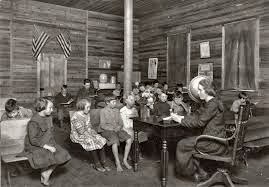 Those words can lead to heartwarming stories, or exaggerations that cause us to giggle when Grandma tells it, as in, “When I was a child I had to walk five miles through an alligator infested swamp, carrying my sister, brother, and three hound dogs to get to school, all before sunup, in a dress, barefoot in the snow.” Well, we solved Grandma’s problem with modern conveniences. I’m not discounting the hardships our ancestor faced. I have only been inconvenienced, living in my backyard during this renovation, for a month now. Even with a working restroom, running water, and electricity in the house, this “totally sucks,” to borrow a phrase from my teenaged former students.
Those words can lead to heartwarming stories, or exaggerations that cause us to giggle when Grandma tells it, as in, “When I was a child I had to walk five miles through an alligator infested swamp, carrying my sister, brother, and three hound dogs to get to school, all before sunup, in a dress, barefoot in the snow.” Well, we solved Grandma’s problem with modern conveniences. I’m not discounting the hardships our ancestor faced. I have only been inconvenienced, living in my backyard during this renovation, for a month now. Even with a working restroom, running water, and electricity in the house, this “totally sucks,” to borrow a phrase from my teenaged former students.
 That’s another thing. I was brought up in a time when saying, “That sucks,” to a teacher garnered you a one-way ticket out the front door of the school for a few days and more than likely a whippin’ at home. Now, I say “that sucks” more than I’d like to admit. Oh, and the threat, “I’ll knock you back to Sunday,” would land my mamma in jail now, but I’m still here and she never beat me. She told my dad and he administered the punishment with the “snake,” a long black belt that we would have to unhook from the closet door and present for the whippin’. We were also sent to “pick out a switch,” and we better be selective. Bringing back a switch that could do no damage meant the adult would go get one of his or her own. Bad move.
That’s another thing. I was brought up in a time when saying, “That sucks,” to a teacher garnered you a one-way ticket out the front door of the school for a few days and more than likely a whippin’ at home. Now, I say “that sucks” more than I’d like to admit. Oh, and the threat, “I’ll knock you back to Sunday,” would land my mamma in jail now, but I’m still here and she never beat me. She told my dad and he administered the punishment with the “snake,” a long black belt that we would have to unhook from the closet door and present for the whippin’. We were also sent to “pick out a switch,” and we better be selective. Bringing back a switch that could do no damage meant the adult would go get one of his or her own. Bad move.
 Yes, I was brought up in a time when you beat your kids into submission. I’m not bitter about it, but I am glad that I chose not to do that to my child. I spanked mine once and that did it for me. He was almost seven when it happened and I refused to ever do it again. I learned the way I was brought up had no bearing on how I disciplined my child. I progressed beyond corporal punishment.
Yes, I was brought up in a time when you beat your kids into submission. I’m not bitter about it, but I am glad that I chose not to do that to my child. I spanked mine once and that did it for me. He was almost seven when it happened and I refused to ever do it again. I learned the way I was brought up had no bearing on how I disciplined my child. I progressed beyond corporal punishment.
“Well, I was brought up in a time when…” is often used to cover deeply ingrained beliefs that are un-retainable in a progressive, more advanced society. The next time I hear someone say, “I was brought up in a time when,” or “I was brought up to believe,” seconds before they use it as an excuse to be bigoted and ignorant, I think I’ll remind them of some of the status quo beliefs of my childhood, which turned out to be as wrong as the people who clung to archaic beliefs and the past without learning from it:I was born in 1961, and was brought up in a time when…
 · The black men called my grandfather and his friends Mr., not out of respect, but out of fear of being thought disrespectful. · We were told whites were the superior race and they alone should decide what was best for all others. · We watched mixed race couples jailed. We saw mixed race children ostracized and bullied.· We were told that God separated the races. Oh, and that he was an old white man with white hair that could strike us dead just for thinking the bible might be a bit behind the times—on the spot, dead, lightning bolt through the head and all, but you didn’t just die, you were going burn in hell for all eternity.
· The black men called my grandfather and his friends Mr., not out of respect, but out of fear of being thought disrespectful. · We were told whites were the superior race and they alone should decide what was best for all others. · We watched mixed race couples jailed. We saw mixed race children ostracized and bullied.· We were told that God separated the races. Oh, and that he was an old white man with white hair that could strike us dead just for thinking the bible might be a bit behind the times—on the spot, dead, lightning bolt through the head and all, but you didn’t just die, you were going burn in hell for all eternity.
 · We were told if they said it in church it was true. (I always thought the flawed "the earth is flat" doctrine took care of that fallacy.)
· We were told if they said it in church it was true. (I always thought the flawed "the earth is flat" doctrine took care of that fallacy.)
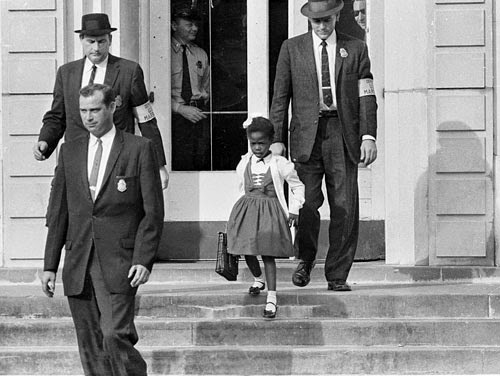 · We watched the same people, who now cheer loudly from the grandstands, deny black athletes had a place on the playing fields with their white children, or in their classrooms.· Politicians and religious leaders told us that applying basic human rights, civil rights, to blacks would be the death of our way of life and was downright unchristian.· We spit on soldiers coming back from war.· We saw students killed protesting that war.
· We watched the same people, who now cheer loudly from the grandstands, deny black athletes had a place on the playing fields with their white children, or in their classrooms.· Politicians and religious leaders told us that applying basic human rights, civil rights, to blacks would be the death of our way of life and was downright unchristian.· We spit on soldiers coming back from war.· We saw students killed protesting that war.
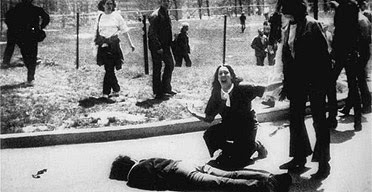
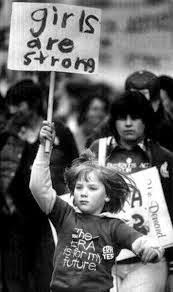 · We were told women were inferior to men, were to be seen and not heard, and should be subservient and compliant.· We were told the only goal in life for a young girl was to be pretty enough to catch a man to take care of her. If a girl wasn’t pretty enough, she should at least know how to cook, clean, and make HIS home comfortable, and be thankful to have him, whether he loved her or treated her with decency and respect. At least, she’d have a man.· We were told good girls don’t get dirty. They also don’t correct a boy when he’s wrong, show him how smart she was, or beat him at any game. (I thought, what fragile egos boys must have.)
· We were told women were inferior to men, were to be seen and not heard, and should be subservient and compliant.· We were told the only goal in life for a young girl was to be pretty enough to catch a man to take care of her. If a girl wasn’t pretty enough, she should at least know how to cook, clean, and make HIS home comfortable, and be thankful to have him, whether he loved her or treated her with decency and respect. At least, she’d have a man.· We were told good girls don’t get dirty. They also don’t correct a boy when he’s wrong, show him how smart she was, or beat him at any game. (I thought, what fragile egos boys must have.)
 · We were told girls weren’t good at math, didn’t make good scientist, and could certainly never be an astronaut, or President. (Still waiting on that last one.)· We were told that only bad girls got raped, and if a good girl did happen to do something to cause a man to rape her, she should just be quiet about it.· We were told a man could beat his children and his wife within an inch of their lives, because a man’s home was his castle.
· We were told girls weren’t good at math, didn’t make good scientist, and could certainly never be an astronaut, or President. (Still waiting on that last one.)· We were told that only bad girls got raped, and if a good girl did happen to do something to cause a man to rape her, she should just be quiet about it.· We were told a man could beat his children and his wife within an inch of their lives, because a man’s home was his castle.
 · We were told that AIDS was God’s punishment for homosexuality.· We saw firsthand the penalties paid by those out of the closet.
· We were told that AIDS was God’s punishment for homosexuality.· We saw firsthand the penalties paid by those out of the closet.
· WE WERE TOLD THAT GAYS, QUEERS, LESBIANS, DYKES, FAGS, TRANNIES, HOMOS, QUEENS, (you get the drift,) WERE SUBHUMAN, CRIMINALS, SEXUAL PREDATORS, HUNTERS OF CHILDREN, MENTALLY ILL, AND NOT DESERVING OF BASIC HUMAN RIGHTS, BUT INSTEAD WORTHY OF PRISON, TO BE HATED AND SCORNED, AND EVEN STONED TO DEATH. (Sadly, these same words can be found in today’s headlines and social media posts.)
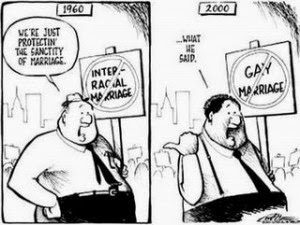
I was brought up in a time of social turmoil and change. We are better for it now. We did learn—well, some of us learned. We progressed and advanced beyond what we were told was right, but knew in our hearts was so horribly wrong. Future generations will look back on our present time and grandchildren will listen to grandma talk about how she used to have an iPhone and had to carry a laptop everywhere, and the Internet was sooooo slow; how she used to have to actually drive the car, how we nearly killed the planet, how children starved while food stores overflowed, and how wars over money, land, religion, and oil killed so many. And she will have to tell them, “I was brought up in a time when equal rights were not equal, when human beings were denied basic rights because of who they loved.” Her grandchildren will be thankful that their ancestors progressed beyond the generations before them. I went to undergrad with a French art student. She had romantic entanglements with men and women, with no regard for color. She said of her preferences, or lack there of, (please purse your lips and read with a French accent,) “The human body is beautiful in all its forms. I should love them all.”
I went to undergrad with a French art student. She had romantic entanglements with men and women, with no regard for color. She said of her preferences, or lack there of, (please purse your lips and read with a French accent,) “The human body is beautiful in all its forms. I should love them all.”
I would like to have the opportunity to leave a note for future generations, which would state, “I lived in a time when humanity learned to embrace our diversity and love us all.”
 Those words can lead to heartwarming stories, or exaggerations that cause us to giggle when Grandma tells it, as in, “When I was a child I had to walk five miles through an alligator infested swamp, carrying my sister, brother, and three hound dogs to get to school, all before sunup, in a dress, barefoot in the snow.” Well, we solved Grandma’s problem with modern conveniences. I’m not discounting the hardships our ancestor faced. I have only been inconvenienced, living in my backyard during this renovation, for a month now. Even with a working restroom, running water, and electricity in the house, this “totally sucks,” to borrow a phrase from my teenaged former students.
Those words can lead to heartwarming stories, or exaggerations that cause us to giggle when Grandma tells it, as in, “When I was a child I had to walk five miles through an alligator infested swamp, carrying my sister, brother, and three hound dogs to get to school, all before sunup, in a dress, barefoot in the snow.” Well, we solved Grandma’s problem with modern conveniences. I’m not discounting the hardships our ancestor faced. I have only been inconvenienced, living in my backyard during this renovation, for a month now. Even with a working restroom, running water, and electricity in the house, this “totally sucks,” to borrow a phrase from my teenaged former students.
 That’s another thing. I was brought up in a time when saying, “That sucks,” to a teacher garnered you a one-way ticket out the front door of the school for a few days and more than likely a whippin’ at home. Now, I say “that sucks” more than I’d like to admit. Oh, and the threat, “I’ll knock you back to Sunday,” would land my mamma in jail now, but I’m still here and she never beat me. She told my dad and he administered the punishment with the “snake,” a long black belt that we would have to unhook from the closet door and present for the whippin’. We were also sent to “pick out a switch,” and we better be selective. Bringing back a switch that could do no damage meant the adult would go get one of his or her own. Bad move.
That’s another thing. I was brought up in a time when saying, “That sucks,” to a teacher garnered you a one-way ticket out the front door of the school for a few days and more than likely a whippin’ at home. Now, I say “that sucks” more than I’d like to admit. Oh, and the threat, “I’ll knock you back to Sunday,” would land my mamma in jail now, but I’m still here and she never beat me. She told my dad and he administered the punishment with the “snake,” a long black belt that we would have to unhook from the closet door and present for the whippin’. We were also sent to “pick out a switch,” and we better be selective. Bringing back a switch that could do no damage meant the adult would go get one of his or her own. Bad move.
 Yes, I was brought up in a time when you beat your kids into submission. I’m not bitter about it, but I am glad that I chose not to do that to my child. I spanked mine once and that did it for me. He was almost seven when it happened and I refused to ever do it again. I learned the way I was brought up had no bearing on how I disciplined my child. I progressed beyond corporal punishment.
Yes, I was brought up in a time when you beat your kids into submission. I’m not bitter about it, but I am glad that I chose not to do that to my child. I spanked mine once and that did it for me. He was almost seven when it happened and I refused to ever do it again. I learned the way I was brought up had no bearing on how I disciplined my child. I progressed beyond corporal punishment.“Well, I was brought up in a time when…” is often used to cover deeply ingrained beliefs that are un-retainable in a progressive, more advanced society. The next time I hear someone say, “I was brought up in a time when,” or “I was brought up to believe,” seconds before they use it as an excuse to be bigoted and ignorant, I think I’ll remind them of some of the status quo beliefs of my childhood, which turned out to be as wrong as the people who clung to archaic beliefs and the past without learning from it:I was born in 1961, and was brought up in a time when…
 · The black men called my grandfather and his friends Mr., not out of respect, but out of fear of being thought disrespectful. · We were told whites were the superior race and they alone should decide what was best for all others. · We watched mixed race couples jailed. We saw mixed race children ostracized and bullied.· We were told that God separated the races. Oh, and that he was an old white man with white hair that could strike us dead just for thinking the bible might be a bit behind the times—on the spot, dead, lightning bolt through the head and all, but you didn’t just die, you were going burn in hell for all eternity.
· The black men called my grandfather and his friends Mr., not out of respect, but out of fear of being thought disrespectful. · We were told whites were the superior race and they alone should decide what was best for all others. · We watched mixed race couples jailed. We saw mixed race children ostracized and bullied.· We were told that God separated the races. Oh, and that he was an old white man with white hair that could strike us dead just for thinking the bible might be a bit behind the times—on the spot, dead, lightning bolt through the head and all, but you didn’t just die, you were going burn in hell for all eternity.
 · We were told if they said it in church it was true. (I always thought the flawed "the earth is flat" doctrine took care of that fallacy.)
· We were told if they said it in church it was true. (I always thought the flawed "the earth is flat" doctrine took care of that fallacy.) · We watched the same people, who now cheer loudly from the grandstands, deny black athletes had a place on the playing fields with their white children, or in their classrooms.· Politicians and religious leaders told us that applying basic human rights, civil rights, to blacks would be the death of our way of life and was downright unchristian.· We spit on soldiers coming back from war.· We saw students killed protesting that war.
· We watched the same people, who now cheer loudly from the grandstands, deny black athletes had a place on the playing fields with their white children, or in their classrooms.· Politicians and religious leaders told us that applying basic human rights, civil rights, to blacks would be the death of our way of life and was downright unchristian.· We spit on soldiers coming back from war.· We saw students killed protesting that war.

 · We were told women were inferior to men, were to be seen and not heard, and should be subservient and compliant.· We were told the only goal in life for a young girl was to be pretty enough to catch a man to take care of her. If a girl wasn’t pretty enough, she should at least know how to cook, clean, and make HIS home comfortable, and be thankful to have him, whether he loved her or treated her with decency and respect. At least, she’d have a man.· We were told good girls don’t get dirty. They also don’t correct a boy when he’s wrong, show him how smart she was, or beat him at any game. (I thought, what fragile egos boys must have.)
· We were told women were inferior to men, were to be seen and not heard, and should be subservient and compliant.· We were told the only goal in life for a young girl was to be pretty enough to catch a man to take care of her. If a girl wasn’t pretty enough, she should at least know how to cook, clean, and make HIS home comfortable, and be thankful to have him, whether he loved her or treated her with decency and respect. At least, she’d have a man.· We were told good girls don’t get dirty. They also don’t correct a boy when he’s wrong, show him how smart she was, or beat him at any game. (I thought, what fragile egos boys must have.)
 · We were told girls weren’t good at math, didn’t make good scientist, and could certainly never be an astronaut, or President. (Still waiting on that last one.)· We were told that only bad girls got raped, and if a good girl did happen to do something to cause a man to rape her, she should just be quiet about it.· We were told a man could beat his children and his wife within an inch of their lives, because a man’s home was his castle.
· We were told girls weren’t good at math, didn’t make good scientist, and could certainly never be an astronaut, or President. (Still waiting on that last one.)· We were told that only bad girls got raped, and if a good girl did happen to do something to cause a man to rape her, she should just be quiet about it.· We were told a man could beat his children and his wife within an inch of their lives, because a man’s home was his castle. · We were told that AIDS was God’s punishment for homosexuality.· We saw firsthand the penalties paid by those out of the closet.
· We were told that AIDS was God’s punishment for homosexuality.· We saw firsthand the penalties paid by those out of the closet.· WE WERE TOLD THAT GAYS, QUEERS, LESBIANS, DYKES, FAGS, TRANNIES, HOMOS, QUEENS, (you get the drift,) WERE SUBHUMAN, CRIMINALS, SEXUAL PREDATORS, HUNTERS OF CHILDREN, MENTALLY ILL, AND NOT DESERVING OF BASIC HUMAN RIGHTS, BUT INSTEAD WORTHY OF PRISON, TO BE HATED AND SCORNED, AND EVEN STONED TO DEATH. (Sadly, these same words can be found in today’s headlines and social media posts.)

I was brought up in a time of social turmoil and change. We are better for it now. We did learn—well, some of us learned. We progressed and advanced beyond what we were told was right, but knew in our hearts was so horribly wrong. Future generations will look back on our present time and grandchildren will listen to grandma talk about how she used to have an iPhone and had to carry a laptop everywhere, and the Internet was sooooo slow; how she used to have to actually drive the car, how we nearly killed the planet, how children starved while food stores overflowed, and how wars over money, land, religion, and oil killed so many. And she will have to tell them, “I was brought up in a time when equal rights were not equal, when human beings were denied basic rights because of who they loved.” Her grandchildren will be thankful that their ancestors progressed beyond the generations before them.
 I went to undergrad with a French art student. She had romantic entanglements with men and women, with no regard for color. She said of her preferences, or lack there of, (please purse your lips and read with a French accent,) “The human body is beautiful in all its forms. I should love them all.”
I went to undergrad with a French art student. She had romantic entanglements with men and women, with no regard for color. She said of her preferences, or lack there of, (please purse your lips and read with a French accent,) “The human body is beautiful in all its forms. I should love them all.”I would like to have the opportunity to leave a note for future generations, which would state, “I lived in a time when humanity learned to embrace our diversity and love us all.”

Published on July 29, 2014 23:06
July 16, 2014
The Beaves is Gettin' Spanked
 "The Beaves is gettin' spanked," I said. She cackled. I laughed with her as I watched a huge thunderstorm roll through Beaver, Oklahoma on the weather radar. We laughed for several reasons. One, because the people out on the Panhandle of Oklahoma need the rain and so do we all. The aquifer under the Panhandle that feeds our rivers is extremely low, as we enter a tenth year of drought. Rain is a welcomed delight and the buckets have been falling this spring and summer. Thank you Mother Nature, even if you have set us back at least 4 weeks in construction. Second, we've taken to watching the weather out on the ranch. Charlie's family is out in Beaver, affectionately known to us as the Beaves, and we often think about them. It's kind of strange when characters feel real. It's kind of cool when the author's wife believes they are real too.
"The Beaves is gettin' spanked," I said. She cackled. I laughed with her as I watched a huge thunderstorm roll through Beaver, Oklahoma on the weather radar. We laughed for several reasons. One, because the people out on the Panhandle of Oklahoma need the rain and so do we all. The aquifer under the Panhandle that feeds our rivers is extremely low, as we enter a tenth year of drought. Rain is a welcomed delight and the buckets have been falling this spring and summer. Thank you Mother Nature, even if you have set us back at least 4 weeks in construction. Second, we've taken to watching the weather out on the ranch. Charlie's family is out in Beaver, affectionately known to us as the Beaves, and we often think about them. It's kind of strange when characters feel real. It's kind of cool when the author's wife believes they are real too.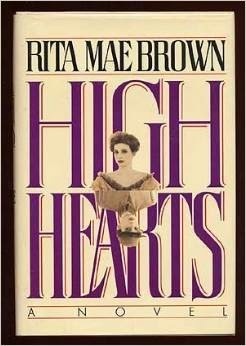 High HeartsBack in June of 1987, I read High Hearts by Rita Mae Brown a few days before going to Williamsburg, Virginia. It was about a week into our relationship and our first trip together. Yes, I know. You are wondering why I was reading a book in the first days of our relationship. She taught summer school and I had a job that freed me in the afternoons. I devoured books back then. I was an English Literature major and read constantly, widely, and sometimes too fast. This particular book grabbed me with its vivid depictions of Calvary soldiers from the Civil War. The book won awards for historical accuracy. I was enthralled.
High HeartsBack in June of 1987, I read High Hearts by Rita Mae Brown a few days before going to Williamsburg, Virginia. It was about a week into our relationship and our first trip together. Yes, I know. You are wondering why I was reading a book in the first days of our relationship. She taught summer school and I had a job that freed me in the afternoons. I devoured books back then. I was an English Literature major and read constantly, widely, and sometimes too fast. This particular book grabbed me with its vivid depictions of Calvary soldiers from the Civil War. The book won awards for historical accuracy. I was enthralled.
We were tooling down an ancient treelined two lane highway outside of Williamsburg, the Colonial Parkway. I spent this beautiful drive telling Deb about the serial killer that killed young lovers on that very parkway, including a lesbian couple, and was never caught. See, I've always been an amateur profiler, studying these guys. The seeds of the Rainey Bell Thriller Series were planted way back then. Anyway, my gruesome tale did not scare her off, though she did rapidly return to Williamsburg proper for a drink.
 On the way back to civilization, we passed a field with a snake rail fence. I became extremely quiet, as I watched the Calvary leap the fences in a charge to the opposite wood. She asked me what I was looking at and I described it to her just like Rita Mae had to me. That became one of the things she loves about me, my stories. She has always been my best audience, because she can see it with me. After I've read something to her she'll say, "I was there," which is an amazing comment for a writer to hear. When the reader, or in this case listener, is right there with you, heart pounding, breath held in a gasp—yes, ma'am—that is what it is all about.
On the way back to civilization, we passed a field with a snake rail fence. I became extremely quiet, as I watched the Calvary leap the fences in a charge to the opposite wood. She asked me what I was looking at and I described it to her just like Rita Mae had to me. That became one of the things she loves about me, my stories. She has always been my best audience, because she can see it with me. After I've read something to her she'll say, "I was there," which is an amazing comment for a writer to hear. When the reader, or in this case listener, is right there with you, heart pounding, breath held in a gasp—yes, ma'am—that is what it is all about.So, when I say, "The Beaves is gettin' spanked," and she smiles and laughs with me, I know she's thinking about Charlie's family out on the Panhandle and I know she loves me.
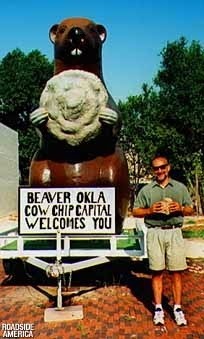
Published on July 16, 2014 19:51
June 27, 2014
R. E. Bradshaw Books
Published on June 27, 2014 19:30
June 8, 2014
Yolanda Wallace stops by to play in the "My Writing Process" blog tour.
I'm hosting my friend and fellow writer Yolanda Wallace for the "My Writing Process" blog tour. She also writes under the name Mason Dixon. So, without further adieu...
My Writing ProcessI was invited to participate in the #MyWritingProcess blog tour by fellow author R. E. Bradshaw. Every author answers the same four questions about her or his writing process and then tags someone else to continue the blog tour.These are my answers:
#1 What am I working on?
 I just finished proofreading my July and August releases, The War Within and Charm City. The two novels couldn’t be more different. The War Within deals with two seventysomething women who originally meet as Army nurses in Vietnam, part due to societal pressure, and encounter each other again forty-seven years later. Charm City, written under my Mason Dixon pen name, charts the adventures of a bare-knuckles boxer and an undercover cop on the gritty streets of Baltimore. My current project, when I can finally find the time to get back to it, is Feat of Clay, a period piece loosely based on the life of Alice Marble, the 1930s American tennis star who acted as a spy for the Allies during World War II. Feat of Clay features two female tennis players, one American and the other German, competing on the court, falling in love off of it, and trying not to become enemies as their countries edge closer to waging war.
I just finished proofreading my July and August releases, The War Within and Charm City. The two novels couldn’t be more different. The War Within deals with two seventysomething women who originally meet as Army nurses in Vietnam, part due to societal pressure, and encounter each other again forty-seven years later. Charm City, written under my Mason Dixon pen name, charts the adventures of a bare-knuckles boxer and an undercover cop on the gritty streets of Baltimore. My current project, when I can finally find the time to get back to it, is Feat of Clay, a period piece loosely based on the life of Alice Marble, the 1930s American tennis star who acted as a spy for the Allies during World War II. Feat of Clay features two female tennis players, one American and the other German, competing on the court, falling in love off of it, and trying not to become enemies as their countries edge closer to waging war.
#2 How does my work differ from others in the same genre?
Early on, my editor gave me a wonderful piece of advice. She told me to forget the occasional flights of fancy to which I was prone at that time and focus on real people with real problems. Since them, I have strived to make my characters as close to “normal” as possible. I want them to seem approachable. Like people the reader would want to strike up a conversation with if they passed each other on the street. Though romance novels are often viewed as escape mechanisms, not every protagonist needs to be independently wealthy, supermodel thin, or blond-haired and blue-eyed.My varied locales set me apart as well. I don’t like to limit myself to one particular part of the country when I choose a setting. When I was in college, an amateur palm reader told me I wouldn’t travel much and I made it my mission to prove her wrong. My books, therefore, are just as peripatetic as I am. To quote the tag line from my business cards, I want my readers to “go between the covers and take a trip around the world.”
#3 Why do I write what I do?Writers write because they have to write. Sometimes, writing feels equally as important as breathing.I began writing because, like most fan fiction aficionados, I wanted to spend more time with a few of my favorite characters and, in some cases, give them the happy endings they didn’t receive the first time around. I began with short stories and gradually progressed to longer works. I gravitated to lesfic because I had been a fan of the genre ever since I read Rubyfruit Jungle in high school and I wanted to try my hand at creating strong female characters like the ones in RJ and the other books I devoured in the years since. Writing was a hobby. A much-needed outlet I performed in my spare time to put the doldrums of the work day behind me. It still is.Standing in the LGBT section of my local bookstore several years ago trying to decide which book to buy, I never dreamed I would one day return to the store and see my books displayed on the shelves. I feel a responsibility to my readers to make sure each of my books is just as good as if not better than the one that came before. That’s the goal, anyway.
#4 How does my writing process work?I read incessantly. At the dinner table. In my office at lunch. In the loo while I’m…Well, you know. I can get an idea from anywhere—a newspaper article, a headline in a magazine, or a throwaway comment in a movie or TV show. I carry a notebook with me at all times just in case I see or hear something that sparks my imagination. Sometimes, though, as was the case for my 2015 release Love’s Bounty, characters break into my dreams at night, fully-formed and demanding that their stories are told. The onus then falls on me to put their lives on paper to their sometimes exacting specifications. When that happens, I feel more like their conduit than their creator, which drastically reduces the amount of time I spend staring at a blank computer screen wishing the words would magically write themselves.
Authors I’m tagging:
Donna K. Ford and fellow Lambda Literary Award finalist D. Jackson Leigh
My Writing ProcessI was invited to participate in the #MyWritingProcess blog tour by fellow author R. E. Bradshaw. Every author answers the same four questions about her or his writing process and then tags someone else to continue the blog tour.These are my answers:
#1 What am I working on?

 I just finished proofreading my July and August releases, The War Within and Charm City. The two novels couldn’t be more different. The War Within deals with two seventysomething women who originally meet as Army nurses in Vietnam, part due to societal pressure, and encounter each other again forty-seven years later. Charm City, written under my Mason Dixon pen name, charts the adventures of a bare-knuckles boxer and an undercover cop on the gritty streets of Baltimore. My current project, when I can finally find the time to get back to it, is Feat of Clay, a period piece loosely based on the life of Alice Marble, the 1930s American tennis star who acted as a spy for the Allies during World War II. Feat of Clay features two female tennis players, one American and the other German, competing on the court, falling in love off of it, and trying not to become enemies as their countries edge closer to waging war.
I just finished proofreading my July and August releases, The War Within and Charm City. The two novels couldn’t be more different. The War Within deals with two seventysomething women who originally meet as Army nurses in Vietnam, part due to societal pressure, and encounter each other again forty-seven years later. Charm City, written under my Mason Dixon pen name, charts the adventures of a bare-knuckles boxer and an undercover cop on the gritty streets of Baltimore. My current project, when I can finally find the time to get back to it, is Feat of Clay, a period piece loosely based on the life of Alice Marble, the 1930s American tennis star who acted as a spy for the Allies during World War II. Feat of Clay features two female tennis players, one American and the other German, competing on the court, falling in love off of it, and trying not to become enemies as their countries edge closer to waging war.#2 How does my work differ from others in the same genre?
Early on, my editor gave me a wonderful piece of advice. She told me to forget the occasional flights of fancy to which I was prone at that time and focus on real people with real problems. Since them, I have strived to make my characters as close to “normal” as possible. I want them to seem approachable. Like people the reader would want to strike up a conversation with if they passed each other on the street. Though romance novels are often viewed as escape mechanisms, not every protagonist needs to be independently wealthy, supermodel thin, or blond-haired and blue-eyed.My varied locales set me apart as well. I don’t like to limit myself to one particular part of the country when I choose a setting. When I was in college, an amateur palm reader told me I wouldn’t travel much and I made it my mission to prove her wrong. My books, therefore, are just as peripatetic as I am. To quote the tag line from my business cards, I want my readers to “go between the covers and take a trip around the world.”
#3 Why do I write what I do?Writers write because they have to write. Sometimes, writing feels equally as important as breathing.I began writing because, like most fan fiction aficionados, I wanted to spend more time with a few of my favorite characters and, in some cases, give them the happy endings they didn’t receive the first time around. I began with short stories and gradually progressed to longer works. I gravitated to lesfic because I had been a fan of the genre ever since I read Rubyfruit Jungle in high school and I wanted to try my hand at creating strong female characters like the ones in RJ and the other books I devoured in the years since. Writing was a hobby. A much-needed outlet I performed in my spare time to put the doldrums of the work day behind me. It still is.Standing in the LGBT section of my local bookstore several years ago trying to decide which book to buy, I never dreamed I would one day return to the store and see my books displayed on the shelves. I feel a responsibility to my readers to make sure each of my books is just as good as if not better than the one that came before. That’s the goal, anyway.
#4 How does my writing process work?I read incessantly. At the dinner table. In my office at lunch. In the loo while I’m…Well, you know. I can get an idea from anywhere—a newspaper article, a headline in a magazine, or a throwaway comment in a movie or TV show. I carry a notebook with me at all times just in case I see or hear something that sparks my imagination. Sometimes, though, as was the case for my 2015 release Love’s Bounty, characters break into my dreams at night, fully-formed and demanding that their stories are told. The onus then falls on me to put their lives on paper to their sometimes exacting specifications. When that happens, I feel more like their conduit than their creator, which drastically reduces the amount of time I spend staring at a blank computer screen wishing the words would magically write themselves.
Authors I’m tagging:
Donna K. Ford and fellow Lambda Literary Award finalist D. Jackson Leigh
Published on June 08, 2014 14:11
June 5, 2014
My writing process...the blog tour.
I was invited to participate in the #MyWritingProcess blog tour by fellow author Barb Winkes. Every author answers the same four questions about his or her writing process and then tags someone else to continue the blog tour.These are my answers:
#1 What am I working on?
 Colde & RaineyI just published the fourth novel in the Rainey Bell Thriller Series, Colde & Rainey. We are renovating our house. In between tearing out plaster and lathe, I’ve been working on a short story. I’d like to keep the details quiet on that one for the time being, but I will be moving on to several projects I’ve had in the works for some time. This summer, I hope to complete the Civil War novel based on the life of my family member, the original Rebecca Elizabeth Bradshaw. The jury is still out on whether she was a lesbian or not, but like the characters in my other novels her sexuality does not define her. Her incredible life was told to me by my relatives, who exclaimed often, “You are just like Decky Bradshaw.” I can only hope I have the courage and fortitude she left as her legacy. Toe to toe with General Sherman in April of 1865, Decky Bradshaw’s actions were heroic and worthy of being remembered. The war she fought was not for her country, but for her family’s survival. #2 How does my work differ from others in the same genre?
Colde & RaineyI just published the fourth novel in the Rainey Bell Thriller Series, Colde & Rainey. We are renovating our house. In between tearing out plaster and lathe, I’ve been working on a short story. I’d like to keep the details quiet on that one for the time being, but I will be moving on to several projects I’ve had in the works for some time. This summer, I hope to complete the Civil War novel based on the life of my family member, the original Rebecca Elizabeth Bradshaw. The jury is still out on whether she was a lesbian or not, but like the characters in my other novels her sexuality does not define her. Her incredible life was told to me by my relatives, who exclaimed often, “You are just like Decky Bradshaw.” I can only hope I have the courage and fortitude she left as her legacy. Toe to toe with General Sherman in April of 1865, Decky Bradshaw’s actions were heroic and worthy of being remembered. The war she fought was not for her country, but for her family’s survival. #2 How does my work differ from others in the same genre?
 I have written in several genres; romance, romantic comedy, mystery, thriller, and dabbled in historic fiction. When asked what I write, I generally answer mystery/thriller, as I have more of those than any other genre. I’m not sure that I’m all that different from others on that shelf, at least I hope not. As opposed to most thriller protagonist, mine are always women and lesbian, but those are simply descriptive terms and not the essence of the character. Like John Sandford’s Prey series main character Lucas Davenport's family is important and we see him interact with them, but the criminal investigation is paramount. I’d like to think that my character’s sexuality is no more integral to the story than Lucas’s. As we advance into the post DOMA world, characters, particulary in the gay and lesbian fiction categories, will change with the political climate. There will always be homophobia, just as race discrimination still clings in portions of our society, but we will move on to novels that don’t require a sexuality label on our genre fiction. “She has a wife” will mean no more than “she has a husband.” I try to write that way now, ignoring the pulp fiction roots of lesbian literature, and moving on to an assumption that thrillers with lesbian protagonist should sit on the same shelf with Patterson, Cornwell, and Sandford.#3 Why do I write what I do?I have a vivid imagination and time on my hands. I was in that state for much of my childhood. I spent a lot of time alone, reenacting the scenes from the copious amounts of books my mother provided for us. Before we could see over the counter at the library, my brother and I had library cards, and spent many hours attempting to read all the books we could reach.
I have written in several genres; romance, romantic comedy, mystery, thriller, and dabbled in historic fiction. When asked what I write, I generally answer mystery/thriller, as I have more of those than any other genre. I’m not sure that I’m all that different from others on that shelf, at least I hope not. As opposed to most thriller protagonist, mine are always women and lesbian, but those are simply descriptive terms and not the essence of the character. Like John Sandford’s Prey series main character Lucas Davenport's family is important and we see him interact with them, but the criminal investigation is paramount. I’d like to think that my character’s sexuality is no more integral to the story than Lucas’s. As we advance into the post DOMA world, characters, particulary in the gay and lesbian fiction categories, will change with the political climate. There will always be homophobia, just as race discrimination still clings in portions of our society, but we will move on to novels that don’t require a sexuality label on our genre fiction. “She has a wife” will mean no more than “she has a husband.” I try to write that way now, ignoring the pulp fiction roots of lesbian literature, and moving on to an assumption that thrillers with lesbian protagonist should sit on the same shelf with Patterson, Cornwell, and Sandford.#3 Why do I write what I do?I have a vivid imagination and time on my hands. I was in that state for much of my childhood. I spent a lot of time alone, reenacting the scenes from the copious amounts of books my mother provided for us. Before we could see over the counter at the library, my brother and I had library cards, and spent many hours attempting to read all the books we could reach. I explained to someone recently that life passes in front of me in moments, and that at anytime I am subject to pluck a moment from time and create a story in my head about it. Strangers have played out there lives in my imagination, for it seems my mind is constantly in need of a good story. Attention Deficit Disorder plays a huge part in that, and instead of a curse, I see it as a tool to creating worlds of my imagination.

So, when a moment passes and my mind creates a compelling story, I write it. The romances were generally generated from song lyrics; the Decky and Charlie adventures from living with the funniest woman in the world. The Rainey Bell Thrillers can be explained by my lifelong obsession with criminal investigation and behavioral analysis. It also explains why, while in New York and passing a large suitcase on the trash pile at the curb, I immediately heard a voice say, “There’s a story in that bag and probably a body.”
#4 How does my writing process work?I begin with characters. I’ll see them in my mind and hear their voices. No, I’m not insane, but I do listen and watch as my mind plays out scenes for me. When I understand what it is that character wants to say, I begin to write. I generally know where I’m starting and ending, but I fly by the seat of my pants in the middle. The Rainey Bell series is a bit different, because I have to know where and when to plant the clues, so a pathway is essential. With the other books, outside of the mystery genre, I let them take me where they will. Sometimes the story will stall out or reverse course. If the writing doesn’t come easy, then I know something is wrong. I can struggle for days and then get hit with the answer while washing dishes.
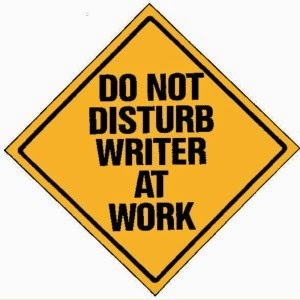 I am fortunate that writing is my job. I write everyday. It may not be for a book, but I write. When a novel is coming fast and furious, I am subject to binge write. I have to watch the clock and force myself out of the chair every two hours for exercise and nourishment, but I will write for weeks on end. My wife, whom I appreciate beyond measure, assumes all responsibilities for our household during these weeks, as I am unable to vanquish the hold the fictional world has on me. To break away to reality is out of the question, because I must know how the story unfolds. I eat, sleep, and breathe with my characters until the tale is written.
I am fortunate that writing is my job. I write everyday. It may not be for a book, but I write. When a novel is coming fast and furious, I am subject to binge write. I have to watch the clock and force myself out of the chair every two hours for exercise and nourishment, but I will write for weeks on end. My wife, whom I appreciate beyond measure, assumes all responsibilities for our household during these weeks, as I am unable to vanquish the hold the fictional world has on me. To break away to reality is out of the question, because I must know how the story unfolds. I eat, sleep, and breathe with my characters until the tale is written. Authors I’m tagging are fellow Lambda Literay Award Finalists: Yolanda Wallace and Marshall Thornton
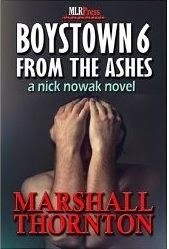 BOYSTOWN 6, From the Ashes by Marshall Thornton
BOYSTOWN 6, From the Ashes by Marshall Thornton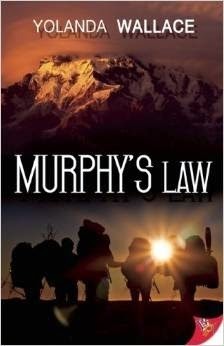 Murphy's Law by Yolanda Wallace
Murphy's Law by Yolanda Wallace
Published on June 05, 2014 16:54
September 23, 2013
Beach, Sand, Waves, Books—What more do you need?
 R. E. Bradshaw will be among the more than twenty-five authors appearing at the
New Smyrna Beach Book Festival
, Friday through Sunday, October 4 – 6, 2013. Locations include the Best Western Oceanfront Hotel, 1401 S Atlantic Avenue, and the Hampton Inn,
214 Flagler Avenue. Festival activities are free to the public.
R. E. Bradshaw will be among the more than twenty-five authors appearing at the
New Smyrna Beach Book Festival
, Friday through Sunday, October 4 – 6, 2013. Locations include the Best Western Oceanfront Hotel, 1401 S Atlantic Avenue, and the Hampton Inn,
214 Flagler Avenue. Festival activities are free to the public. Invited authors were selected through a committee that took recommendations from the community, educators, and state-wide literary groups. With book readings, Q&A sessions, book signings, writers' workshops, festival bookshop, and nightly author socials, the
New Smyrna Beach Book Festival
provides activities for everyone from the avid to the recreational reader.
Invited authors were selected through a committee that took recommendations from the community, educators, and state-wide literary groups. With book readings, Q&A sessions, book signings, writers' workshops, festival bookshop, and nightly author socials, the
New Smyrna Beach Book Festival
provides activities for everyone from the avid to the recreational reader.R. E. Bradshawwill be discussing the latest in the award winning Rainey Bell Thriller series, The Rainey Season, at the Hampton Inn location, 11:30 am to 12:30 pm. For a complete schedule and info on the attending authors follow this link: http://nsbfla.com/images/content/2013fall_bookfestival.pdf, or text “Author” to 71441 for a complete schedule sent to your smart phone.
"Meet the Author" socials are scheduled each night. Friday night's social will take place at Toni & Joe's Oceanfront Patio (309 Buenos Aires St) from 7 pm - 8:30 pm. Saturday's will be at Barracuda's Bar & Grill (203 S Atlantic Ave) also from 7 pm - 8:30 pm, and the Sunday night social is at Flagler Tavern (414 Flagler Ave) from 4:30 pm-6 pm.
“Come stick your toes in the sand with me and let’s talk about books.” ~ R. E. Bradshaw
Published on September 23, 2013 21:17




